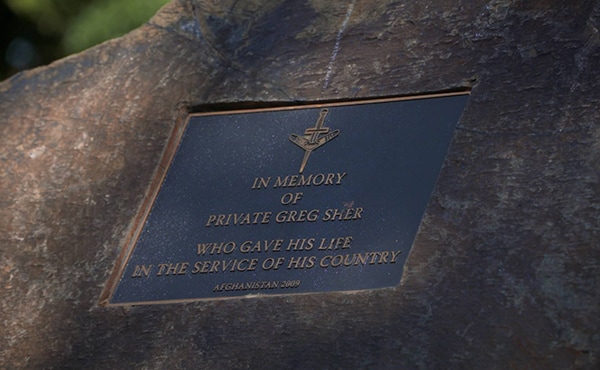PRIVATE Gregory Michael Sher was killed in a rocket attack in Oruzgen Province, Afghanistan on January 4, 2009 at 12:55pm Afghan time (19:25 AEST). He was 30 years old. Born in South Africa on December 3, 1978, Sher moved to Australia with his family in 1986. After finishing high school, Sher joined the Australian Army as an Army Reserve infantryman in 1998. He was deployed to East Timor in 2003 and in 2008 was deployed to Afghanistan. A member of the Sydney-based 1st Commando Regiment, Sher was with the Special Operations Task Group, which had deployed from Tarin Kowt to a provincial patrol base, at the time of his death. Almost 10 years on since his tragic passing, Sher’s parents, Felix and Yvonne, will light the cauldron before the Anzac Day Eve match between Melbourne and Richmond at the MCG. Here they share their story about their son, Greg, with Melbourne Media …
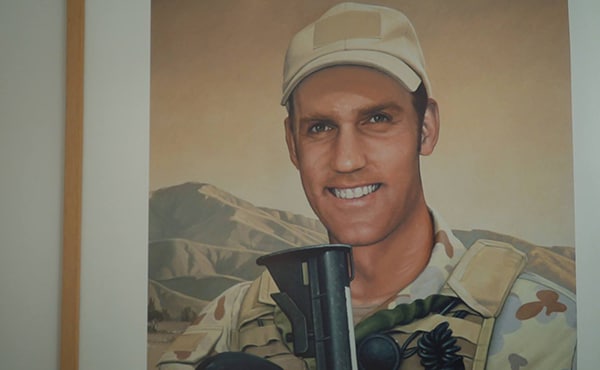
REMEMBERING GREG SHER
Matt Burgan: Thank you for sharing your story. It’s greatly appreciated. Firstly, what are your memories of Greg?
Felix Sher: Greg was a wonderful young man. He loved life. He enjoyed life. His passion for the military was just unbelievable. All he wanted to do was be a solider as a kid, and he joined the Australian Defence Force in 1998. He served in the Unit 5/6 Royal Victorian Regiment and then in 2004, he moved to One Commando Regiment, after qualifying through a very rigorous course. He was keen on bodybuilding, he watched his diet and he regularly ate what he should eat. He was very, very caring about his health.
Yvonne Sher: He was a fun-loving person. He just wanted to get out there and enjoy life. He had a very infectious smile and he loved reading.
Felix: On that particular point with reading, there is a bookshelf in Greg’s room and it’s got as many military books as you can think of, about SAS manuals, on what to do and other military books. There are psychology books on the military and on training, and among all of those books, there is a book that makes me really proud. That’s one called: ‘How to manage your parents’. (laughing). That was the kind of guy he was.
MB: Was Greg’s interest in the military due to his family history?
Felix: I think it’s just him [and the way he was] born.
Yvonne: His grandfathers and his father [were in the military].
Felix: We were all in the military. When we lived in South Africa, we had conscription, which means you had to go to the army and do a basic course and then you did 10 years of conscripted duty. You went every year for a month or three months – every second year was three months – and I guess seeing me in uniform and his grandfathers, who were in uniform as well, in the Second World War, he probably took a fancy to the military way of life. That evolved and he joined the military.
MB: As a family, you moved from South Africa to Australia in 1986. It’s a courageous move for anyone to start a new life in another country. What was it like for your family?
Yvonne: As a family, it was actually relatively easy, because we were all together and we knew what a wonderful country we were going to. So, it made things a lot easier. The children, all three of them, really blossomed when they got here, so it was a wonderful move and we’ve never ever regretted it.
MB: Steven and Barry are your other children. Can you share a little bit about them?
Felix: Steven is Greg’s older brother. He also loves the country he lives in. He couldn’t be more happy to be here. Him and Greg were very, very close. They were only 15 months apart in age, so they were almost like twins. Both of them were mad about the military and used to practice their parachuting by jumping off the jungle gym with a Coles bag on their back. So, that’s how they got involved, by playing soldiers and getting involved in the military.
Barry was a little bit younger than Greg, by four and a half years. He was also very, very close to Greg. They were very good mates and did a lot of things together. When Gregory passed away, it was difficult for us, particularly his brothers.
MB: What was Greg like as a child?
Yvonne: Babyhood, he was a really good baby. As a toddler, he was a really outgoing little boy. You could see the fun-loving [nature] starting to come through. He was a good child. He had very good manners. He could charm his teachers and they all used to tell me, when we went for school interviews, how well-mannered he was and how charming he was. So, they kind of forgot about the bit when he didn’t do his homework because he really charmed them. He was a good kid, I must say. We were never really worried about him growing up.
MB: Where did Greg go to school?
Yvonne: He went to Doncaster Park Primary School and then Doncaster Secondary College. He was a good student. He was conscientious, as long as he could have his fun at the same time. That was fine. As a teenager, he was full of fun, and enjoying life, but basically a good kid.
Felix: He was a chocoholic. He loved his chocolate. He couldn’t get enough chocolate and he would never put on weight, because he would just train so hard and he’d burn it up. Then he went to high school at Doncaster Secondary College. Still, the military was what was foremost in his mind. As soon as he finished [school], he got involved with an organisation that was involved with community security. So, he would do his day job of community security and then go to the military as well.
Yvonne: He did go to university, and he did do a bachelor of business and he did study some financial planning. But he said ‘It’s not what I want to do, and I’m doing this because I have to do it’. He gave it up as soon as he could really.
Felix: In 2003, he went with the Royal Victorian Regiment to East Timor as part of the United Nations peacekeeping force. That’s when East Timor became independent. He spent six months in East Timor, and then came back and spoke to a lot of his mates, who had been to Iraq or were going to Afghanistan. That was his next move – to go to Afghanistan. But he actually didn’t tell us he was going.
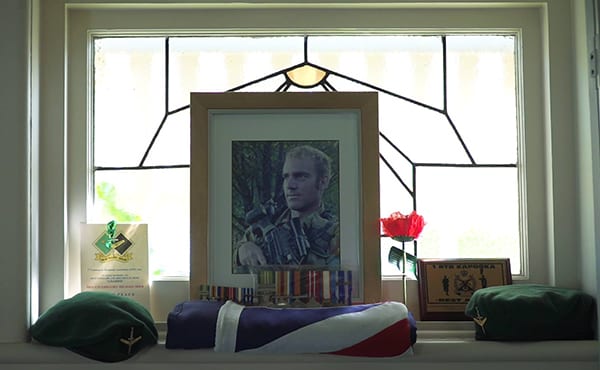
THE LOSS OF GREG
MB: Afghanistan, of course, was where Greg was tragically killed. Can you talk about what happened?
Felix: When he applied to go [to Afghanistan], he didn’t tell us he was going. He told his brothers and his partner Karen he was going, but we didn’t know. He told us he was going off to do training in South Australia. What happened, Yvonne and I went away on a weekend to Daylesford and Monday at 3am, we got a phone call in the hotel and we thought it was some crazy person dialling the wrong number internally. But, it was Barry and I said ‘Barry, what’s wrong and what’s happened?’ He said ‘It’s Greg, Dad. He had an accident’. I said ‘Where is he?’ He said ‘he was killed’. I said ‘how’. He said ‘by a rocket’. I said ‘where?’ He said ‘in Afghanistan, so you better come home, [because] the military is here waiting for you’. Yvonne was standing behind me, and I [thought] how am I going to tell her? Anyway, I told her and the shock of hearing this news. We just packed up our things very quickly at 3:30am or 3:45am and we paid the bill downstairs, got into the car and thank goodness, my car had a GPS, because I couldn’t quite fathom which way to go. I put in my home address, got in the car and started driving and then starting arguing with the GPS, as it said ‘turn right’. Anyway, I settled down and thought it knew better than me and [I] just followed it home.
The military waited for us [at home] and [when we arrived home], they started telling us what had happened. Of course, our main concern was bringing Greg back. How was this going to happen? When would it happen? This was Monday. In the Jewish religion, when someone passes away, you’ve got to put them to rest as soon as possible, unless there is some untoward reason like a murder. Friday, he came back on the [Boeing] C17 [Globemaster III], a huge military plane. He went into the back of the plane and his coffin was there and one of his mates had accompanied him back, along with the air crew, of course. The whole family went in and we stood around the coffin and I read a few words from a few psalms. Then we had the ceremony with him – in the hangar, where they presented him with his medals and a beret. And then we left. This was on a Friday, late on Friday, and you can’t have a funeral after sunset in the Jewish religion on a Friday or on a Saturday. So, we had to wait until Sunday to have the funeral. It was attended by more than 3,000 people, including the prime minister [Kevin Rudd] and the opposition leader [Malcolm Turnbull] at the time, and many other politicians. They were all really very nice to us – both Liberal and Labor. And, so it was, the funeral took place and that was it.
Then there has been a whole series of events after that. And we’ve just been involved in the military since then.
MB: As parents, how do you cope with the loss of a son, particularly after hearing that news?
Yvonne: You do what you have to do. You have to be strong. We have other children that we have to be strong for, so you learn how to live with this. The pain never goes away and it never gets any easier, but you just have to learn how to live with it and continue for the other people around you. You don’t want to bring them down with you or see them down. So, you learn to live a different way of life.
Felix: The best way I can describe it is if you look at some of these top athletes, who have lost a limb – [it’s like] we’ve lost part of ourselves with Greg. These athletes, despite having lost a limb, get on with their lives. You have to look forward and that’s what they do, so they have the Paralympics and you see these excellent performances by these people without arms or without legs. It’s the same thing – we’ve lost a part of ourselves and we’ve got to keep moving forward. You’ve just got to look ahead. If you keep on watching the rear-view mirror, you’re going to crash and then there are more problems that are going to arise. Unfortunately, that’s happened with some families, where they have just fallen apart, and it’s very tragic and very sad.
MB: Naturally, you were aware of the risks with Greg serving. But sadly, did it take this tragic event to occur before it really hit home?
Yvonne: That’s exactly why he didn’t tell us where he was going, because he didn’t want us to sit and worry, while he was away, and that was why he didn’t tell us. He preferred to just let things be. I suppose he would have come home and said ‘you’ll never guess where I’ve been’. The reason he didn’t tell us was just simply to save us that worry.
Felix: While he was away, a letter arrived. On Christmas Day, Greg phoned us and I said to him ‘where are you?’ He said ‘I’m in South Australia’. I said ‘how are you phoning?’ He said ‘on a satellite phone’. [I thought] ‘you can use any phone from South Australia’. That was the first trigger. Anyway, I got hold of Barry, and I said ‘I’ve got a feeling Greg is in Afghanistan’, because before he left, he grew a beard – the special forces guys grow beards. He’d actually cleaned out his room, cleaned out his clothes and he cleaned out everything as if he wasn’t coming back. I said to Barry, ‘so, where is Greg? I think he’s gone to Afghanistan.’ Barry wouldn’t deny it and he wouldn’t confirm it. When Greg’s phone came back, his mobile phone, I saw some of the messages that were on there. One was from Barry to Greg and it said ‘I think Dad knows where you are’. Then Greg says ‘well, you better tell him’. And that was it. But he didn’t tell.
MB: Would you have liked to have known where Greg was, or were you content with his decision not to worry you?
Felix: I would like to have known in order to wish him well.
Yvonne: I think I would’ve preferred that he didn’t tell me, because I would’ve been extremely nervous while he was away. It was probably a good decision that he made, as far as I’m concerned.
MB: How were Barry and Steven, given they knew Greg was in Afghanistan?
Felix: To them, it was a big secret. They had the secret and the parents didn’t know, [so they were] like naughty boys – except that they were old naughty boys. They were in their late 20s, early 30s. They should’ve told us, I think.
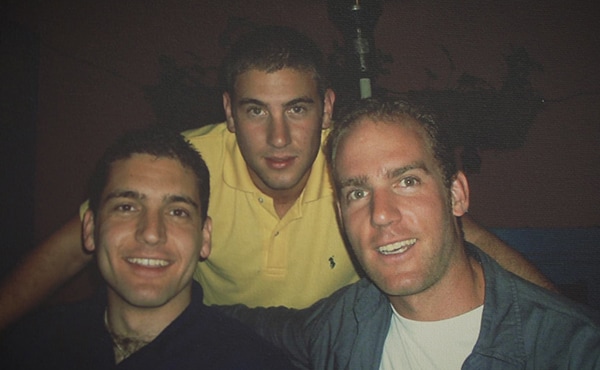
(Picture from left to right: Steven, Barry and Greg Sher)
LIFE WITHOUT GREG
MB: Many Australians have had family who have served – perhaps in the First World War, the Second World War or Vietnam. But there are many Australians who have family serving today. Have you found many people are perhaps naïve to the fact that you had a son serving – and who made the ultimate sacrifice?
Felix: Yes, they are. I [recently] went to a work event and there were some people sitting next to me and somehow the story came out, because I normally wear the Commando badge on my jacket. So, they pose a question and we tell them all about the Melbourne Football Club and what’s happening now with Anzac Day [Eve]. You can basically see the sympathy and compassion they express at the loss of a soldier. [Then they ask] ‘how do you manage?’ You tell them ‘you’ve got to keep on looking ahead, and you’ve got to keep on looking forward, not backwards’.
Yvonne: I find people are extremely respectful – definitely.
MB: Have you met many families who have experienced similar?
Yvonne: We’ve pretty much met all of the families, yes.
Felix: Some families cope better than others. Once a year we have an event – a dinner for the families of the fallen. That dinner takes place in a different city in September each year. The reason why it’s September is because September was the only month where a solider wasn’t lost in Afghanistan. So, each year in September, we have a dinner and we meet some of the families. Now, some of the families don’t want to come and they don’t want anything to do with the military. Other families are regulars and some families have fallen apart, where parents have divorced, because it is extremely traumatic. The grieving process is different for different people – wives grieve differently to husbands and that kind of thing. Another example is that when we were invited to Afghanistan in 2013, the military offered all of the families to go. Some families weren’t interested, and in other instances some members of the family went and others didn’t want to go. In other instances, there were wives there, where the husbands weren’t interested in going, so it’s quite different, in terms of the grieving process – and coping with it.
MB: From your experience, has the military been respectful and acted in the best interests of your family?
Felix: Incredibly.
Yvonne: Definitely.
Felix: Unfortunately, some families look for someone to blame. To explain what happened with Greg, he was in a forward base. He had left the main base and they were due to go out on a mission that night. Because of the weather conditions, they couldn’t. Anyway, the Taliban attacked the camp in the afternoon – our night time, but it was their afternoon. They shot two rockets and one rocket just fell short. It was a dud. The other rocket was also a dud, but it went through a HESCO wall. It then hit a container, but didn’t explode. It went through the container, which was full of water bottles and came out the other side. Greg happened to be on the other side and it just went through him. It then passed through a group of 10 or 12 soldiers and didn’t touch one of them. So, who do you blame? It’s not the military’s fault. But some people find reason to blame the military for some of these events and it’s pretty sad.
MB: Without wanting to be disrespectful in any way, has any good come from Greg’s loss?
Felix: Look, every cloud has a silver lining. Some of the people that we’ve met, as a consequence of Greg’s passing – we would never have met before, and they’re the most amazing people. So, these things do have something positive coming out of it. Also, we’ve learned what the military is about and some of the people that were Greg’s mates – [they’re] wonderful, wonderful young men. [And we’ve met their] families, which we wouldn’t have previously. So, yeah, I guess there is something positive that comes out of it.
MB: It’s been almost 10 years since Greg’s passing. Does it still seem surreal?
Yvonne: At times, it feels like 10 years have passed so quickly and at other times it feels like it’s gone so slowly. I often can’t believe it’s nearly 10 years. A lot has happened in that time. We’ve had five new additions to the family, with another one on the way. We’ve also had two daughters in law join the family, so a lot has happened – a lot of wonderful things. But with each wonderful event, it highlights the loss even more, because you realise what Greg is missing. So, as wonderful as it is, it always brings it all back home.
Felix: It also highlights what we’re missing in him, because he would be in the future and he would’ve also produced a family – we know he would’ve produced a family. So, that’s a collateral loss for the future. In terms of how I feel – I speak for myself – there are still peaks and troughs. The troughs are not as deep as they used to be, and they’re further apart, and sometimes they come.
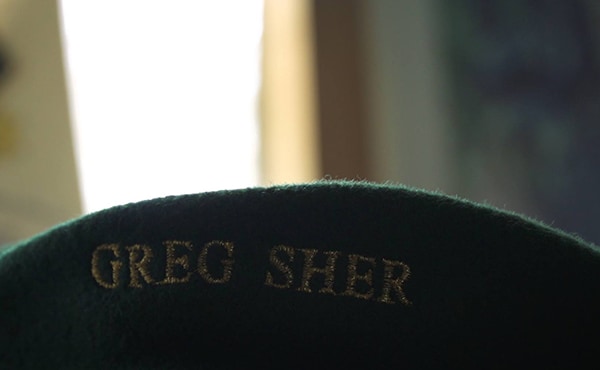
THE GAME AND ANZAC DAY
MB: On Tuesday night, you’re involved in an event, which has quickly become an important occasion on the football calendar: the Melbourne and Richmond match at the MCG. It’s not comparable to war or what you’ve been through, but how important is it for your family to be involved in the event, by lighting the cauldron pre-match?
Yvonne: I’ll do anything to honour Greg. If I could stand at the top of the world and shout out to the world and tell them what a wonderful person he was – and what he did, and what he did for his country, I would. If this is something that I can do to honour him – and to honour his memory, I’ll do it.
Felix: I’ll go along with that – exactly the same as Yvonne. As long as we can honour his memory, we’ll do it. So, the next morning we’ve got to be up at the Dawn Parade at 5:30am. After that, we normally go to the cemetery and put a wreath on his grave. So, we work through it.
MB: What do you think lighting the cauldron will be like?
Yvonne: I think it’ll be very special.
Felix: Yes, it’s like lighting a huge candle in his memory.
Yvonne: And in the memory of all of the other soldiers as well.
MB: And Barry is tossing the coin before the game.
Yvonne: Yes, he is.
Felix: Yeah, Barry is tossing the coin and believe it or not Steven had the chance to take his family to toss the coin. So, he actually went to the St Kilda and Richmond match [last year]. He and his family tossed the coin there, so we’re very lucky to have had two years in a row to have been involved in that.
MB: What does Anzac Day mean to you now, given what you’ve been through?
Felix: It’s an opportunity to honour all those that have sacrificed their lives to provide for our wonderful lives in Australia. And we should do everything we can to honour them – going to the parades, going to the morning service. Anzac Day should become the most major event and hopefully it will be promoted to become that way.
MB: How important is it that Greg, and others who have recently served or continue to serve today, gain recognition on Anzac Day?
Yvonne: When you walk and do the march from the city to the Shrine and you see the people who line the streets, you do realise that people out there do honour their war heroes.
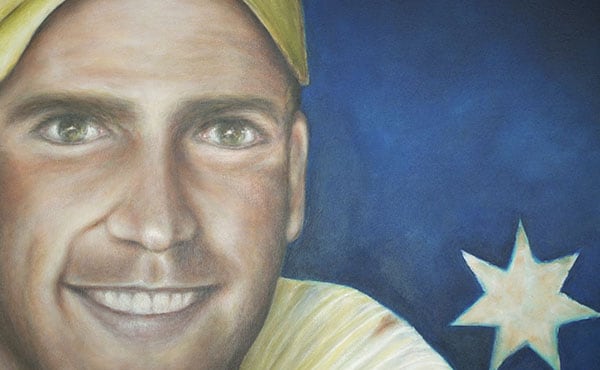
GREG’S LEGACY
MB: What are some of the stories you’ve heard about Greg from other soldiers?
Felix: One of the key things was his commitment. For example, there’s a picture where he’s about to commence a parachute jump.
Yvonne: [His mate says to Greg] ‘How can you be smiling, as you’re about to jump out of an aeroplane?’
Felix: Greg said ‘would you rather be sitting in the office behind the desk?’ That was [what] he was all about. Then when he went on his SAS training, he did a diary of exactly what he ate and what he did. He published that, which he wasn’t supposed to, but he helped those going through it prepare for what they might endure.
Yvonne: There was a story when he arrived in Afghanistan – there was a new weapon they were going to be using that he hadn’t trained to use. So, he was sent off to go and learn how to use the weapon. When he got there, there were a whole lot of Afghan soldiers also being trained. He was shown how to use it and he picked it up really quickly. The person that was training them said ‘have you got any spare time, now that you’re so proficient in using this weapon. Can you help me teach the other Afghans how to use it?’ He said ‘yes, I’ve got about an hour – I can help you’. And he started helping teach the Afghans how to use this weapon. All the Afghan soldiers were calling him ‘Mr Greg’. And when Greg left, the captain, who was there, said to the soldiers, ‘did you like ‘Mr Greg’?’ They said ‘he was really good. He was so patient with us and taught us so well. He was really wonderful’. The captain said ‘did you know Mr Greg is Jewish?’ They said ‘no, we’ve never met a Jewish person in our lives’. They said ‘wow, this is special, if this is what Jewish people are about’. So, they clearly had no idea and automatically had a dislike. When they finally met him, they really took to him. That was quite interesting, I thought. It just showed how quickly he learned about this new weapon. He was able to then teach others so quickly as well. That was an enlightening experience for everyone.
Felix: When the Ram Ceremony takes place … [which is] when the soldiers line-up and load the coffin of the soldier, who was killed, onto the back of the vehicle – they drive through the soldiers lined-up. They then take the coffin to the aircraft. Normally, the Afghans wouldn’t attend, but all of them attended Greg’s Ram Ceremony.
Yvonne: There was another lovely story we heard from a lady soldier, who happened to be on the plane with him, going over to Afghanistan. She somehow had an uncomfortable seat on the plane. I think they were all able to lift the armrests and lie down, but she was in a seat where the armrest was fixed and she couldn’t lie down. After a while, she was moaning and groaning about this uncomfortable seat she had. So, he swapped seats with her and let her have a seat, where she could have a little sleep. She wrote to us afterwards and told us that it meant so much to her – that he gave up his seat for her. I thought that was quite a special little story that she sent us.
MB: Greg was a decorated solider. What do his medals mean to the family?
Felix: I think the medals were a secondary thing. The medals were someone else’s acknowledgement of his services and efforts. But to Greg, it was the mere fact he participated and was there – that was the main thing. The medals weren’t what he was trying to achieve. He wasn’t trying to get medals.
Yvonne: He wasn’t that kind of person. They wouldn’t have been important to him.
Felix: He wasn’t materialistic at all, Gregory – not in any way. In Timor, one of his tasks was as a medic. He said ‘you see these little kids – they’ve got nothing and they wake up every morning with a smile’. He would be out there [in the morning] attending to one of the kids. That was the most important part of what he was there for.
Yvonne: His exact words were ‘I’ve never seen so many people who have so little, look so happy’.
Felix: If you go to the Shrine of Remembrance in St Kilda Rd, and you look at the exhibition of current wars, there is a lot of stuff about Greg there. There is a little story about him too. One of the things I said about him was ‘here was a Jewish man, going to a Muslim country to help these women who were having acid thrown at them and kids being stopped from being educated. His objective was to help them get educated and protect them from being hurt’. So, if you look in the Shrine, there is that little bit about him.
MB: Hearing your story is a great example of what Australia is about. You’re a family from South Africa, with a Jewish faith and Greg has served the country in Afghanistan. Is that something you reflect on?
Felix: You know what, the bottom line is – irrespective of your religion or your beliefs – you can still mix without dissolving. And so, no matter what you believe – you can still meet the most incredible people, who we might not have met prior to Greg’s passing. Irrespective of what the religion might be – the key thing is to integrate, to accept and to become the country you immigrate into, rather than trying to bring part of your country and [trying to] change the country you’re immigrating to. You become immersed into what that country’s about – rather than try to change it.
Yvonne: This is the country we chose for the values that we have. This is how we want to live.
MB: Given everything you’ve been through – what’s your message or how do you summarise your story?
Felix: That’s a hard one to summarise. But basically, irrespective of what unfortunate events that might occur in your life, try and look ahead, look forward and keep going. Don’t let the event retard your future progress. Look ahead and move forward – basically that’s the message I would have for anyone. Just don’t let any unfortunate, sad or tragic event have a damaging effect on your life as well – just look forward and keep going.
Yvonne: We’ll never forget Greg. He’s always going to be part of our lives. We’ll always feel he’s around and with us, and so you have to move on and as Felix says ‘look ahead, remember the past [because] we have all of these wonderful memories’. You can’t let it dominate your life and you can’t let the sadness ruin you. It tears you apart – it really does – but you have to be strong and move forward and look ahead.
MB: And finally, as Greg’s parents, what would you like his legacy to be – personally and publicly?
Felix: Well, from a personal perspective, he has bestowed incredible honour on our family. In terms of what he did and how he passed. So, that’s from a personal perspective. From a public perspective, he served his country and he did it willingly and he wasn’t conscripted. He volunteered to do it and as a matter of interest, he was the only reservist – out of all 41 who were killed. All of the others were permanent soldiers and Greg was from a Reserve Unit. So, in other words … those soldiers were doctors, barristers, mechanics and advertising agents – they’re not full-time military. So, they train and then off they go to do their military and service. They do it on a voluntary basis – not a conscripted basis. So, from a public perspective, I can only recommend that wherever possible, people go to the military, because the military has a very positive effect on people’s lives. It helps in a thinking process and enhances a sequential way of thinking. And it’s a very positive thing to go to the military, and at the same time serve your country.
